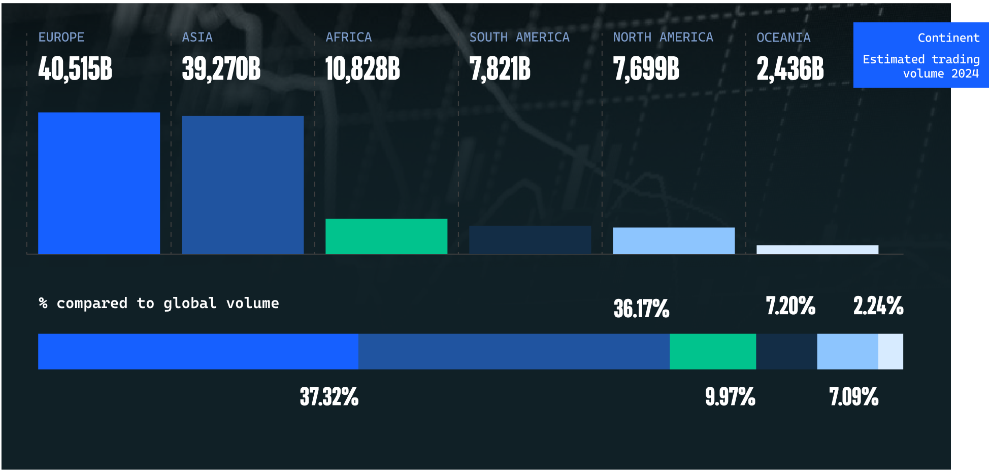Global Crypto Trading Set to Explode in 2024
01.08.2024 9:30 2 min. read Alexander Stefanov
In 2024, global cryptocurrency trading is set to reach over $108 trillion, a dramatic increase of nearly 90% from 2022, according to Coinwire.
The U.S. is expected to lead this surge, with trading volumes projected to exceed $2 trillion.
Crypto trading volumes have grown 42% since 2023, reflecting a broader market expansion of 89% over the past three years. This growth underscores a worldwide rise in the adoption of digital assets.

Europe is the largest player in crypto trading, responsible for 37.32% of the global transaction value, with Russia and the UK leading in volume. Turkey and India are significant contributors, each surpassing $1 trillion in trading activity.
Asia ranks second in global crypto transaction value, holding 36.17% of the market. The region’s growth is driven by high mobile usage and strong technological infrastructure.
Binance remains the top crypto exchange, leading in 100 of 136 countries with a trading volume of $2.77 trillion. Other major exchanges include OKX and CEX.IO, with volumes of $759 billion and $1.83 billion, respectively. Coinbase and Bybit also have substantial volumes, trading in 90 and 87 countries.
Despite recent market turbulence, including the collapse of FTX and regulatory hurdles, centralized exchanges drove $36 trillion in trading last year, spurred by optimism around U.S. Bitcoin ETFs. The latest data also shows stablecoins surpassing Visa’s monthly transaction average, highlighting their growing influence in the financial landscape.
-
1
UK Regulators Unveil PISCES – A New Era for Private Share Trading
11.06.2025 15:00 2 min. read -
2
Trump Turns 79 With Billions in Crypto and a $45M Parade
14.06.2025 22:00 2 min. read -
3
Polygon Breaks from Decentralization as Sandeep Nailwal Assumes Full Control
11.06.2025 20:00 2 min. read -
4
KuCoin Plants Its Flag in Bangkok With a Licensed Thai Exchange
14.06.2025 13:00 1 min. read -
5
Nvidia CEO Urges UK to Invest in AI Infrastructure or Risk Falling Behind
10.06.2025 9:00 1 min. read
What Will Happen With the Stock Market if Trump Reshapes the Fed?
Jefferies chief market strategist David Zervos believes an upcoming power shift at the Federal Reserve could benefit U.S. equity markets.
U.S. Bank Advises Clients to Drop These Cryptocurrencies
Anchorage Digital, a federally chartered crypto custody bank, is urging its institutional clients to move away from major stablecoins like USDC, Agora USD (AUSD), and Usual USD (USD0), recommending instead a shift to the Global Dollar (USDG) — a stablecoin issued by Paxos and backed by a consortium that includes Anchorage itself.
Vitalik Buterin Warns Digital ID Projects Could End Pseudonymity
Ethereum co-founder Vitalik Buterin has voiced concerns over the rise of zero-knowledge (ZK) digital identity projects, specifically warning that systems like World — formerly Worldcoin and backed by OpenAI’s Sam Altman — could undermine pseudonymity in the digital world.
What Are the Key Trends in European Consumer Payments for 2024?
A new report by the European Central Bank (ECB) reveals that digital payment methods continue to gain ground across the euro area, though cash remains a vital part of the consumer payment landscape — particularly for small-value transactions and person-to-person (P2P) payments.
-
1
UK Regulators Unveil PISCES – A New Era for Private Share Trading
11.06.2025 15:00 2 min. read -
2
Trump Turns 79 With Billions in Crypto and a $45M Parade
14.06.2025 22:00 2 min. read -
3
Polygon Breaks from Decentralization as Sandeep Nailwal Assumes Full Control
11.06.2025 20:00 2 min. read -
4
KuCoin Plants Its Flag in Bangkok With a Licensed Thai Exchange
14.06.2025 13:00 1 min. read -
5
Nvidia CEO Urges UK to Invest in AI Infrastructure or Risk Falling Behind
10.06.2025 9:00 1 min. read


